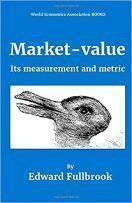From Edward Fullbrook Here is a passage from an article that appeared last week in The Guardian. With one day of trading to go, 2019 is on course to be one of the strongest in the history of financial markets after shares around the world racked up record after record in another barnstorming year. On Wall Street the Dow Jones industrial average has gone up almost 25% having reached record highs day after day, while the broader S&P500 is up 30% and the tech-heavy Nasdaq has grown 40% in value. The FTSE100 in London is close to its record high, as is the Dax30 in Germany. In the Asia Pacific, the Nikkei is up 15% while Australia’s ASX200 is still close to its highest ever point (reached in November). But none of these countries, with the exception of the US, are in particularly good
Topics:
Edward Fullbrook considers the following as important: Uncategorized
This could be interesting, too:
tom writes The Ukraine war and Europe’s deepening march of folly
Stavros Mavroudeas writes CfP of Marxist Macroeconomic Modelling workgroup – 18th WAPE Forum, Istanbul August 6-8, 2025
Lars Pålsson Syll writes The pretence-of-knowledge syndrome
Dean Baker writes Crypto and Donald Trump’s strategic baseball card reserve
from Edward Fullbrook
Here is a passage from an article that appeared last week in The Guardian.
With one day of trading to go, 2019 is on course to be one of the strongest in the history of financial markets after shares around the world racked up record after record in another barnstorming year.
On Wall Street the Dow Jones industrial average has gone up almost 25% having reached record highs day after day, while the broader S&P500 is up 30% and the tech-heavy Nasdaq has grown 40% in value. The FTSE100 in London is close to its record high, as is the Dax30 in Germany. In the Asia Pacific, the Nikkei is up 15% while Australia’s ASX200 is still close to its highest ever point (reached in November).
But none of these countries, with the exception of the US, are in particularly good shape. Instead their stock markets are being sustained by ultra-low borrowing costs led by the US Federal Reserve.
This latest round of rate cutting has turned many of the assumptions about economics on their head to create a bad-news-is-good-news paradigm for markets.
Do these huge increases in the market-values of stocks mean that the riches of the world, including assets and income, have increased hugely in 2019? That depends on what kind of metrical structure market-value has.
Is market-value what is termed an absolute quantitative order like length and mass whose magnitudes exist independently of other instances of that magnitude, or is it a relative one like probability? If it is an absolute quantitative order, as Economics 101 infers, and the market-value numbers assigned to non-stock riches remained comparatively unchanged, then the riches of the world increased hugely in 2019. But if on the other hand market-value is a relative quantitative order, then what we have witnessed is not a huge increase in the world’s riches but rather a huge redistribution of them – a redistribution between income and assets, and between people who own lots of assets and those who don’t. Which do you think happened? And if it was the latter, why wasn’t it reported and discussed, because surely it deserves to be big news?

